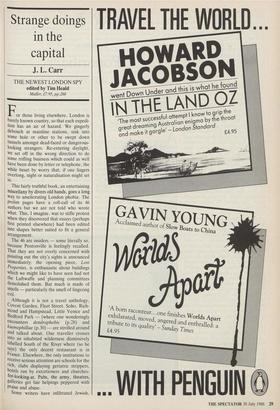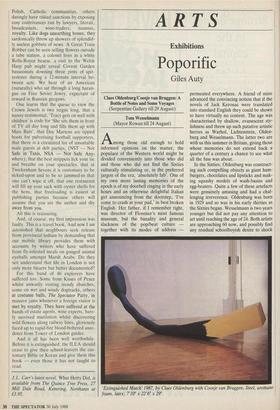Strange doings in the capital
J. L. Carr
THE NEWEST LONDON SPY
edited by Tim Heald
Muller, f7.95, pp.268
For those living elsewhere, London is barely known country, so that each expedi- tion has an air of hazard. We gingerly debouch at mainline stations, sink into some hole or other to be swept down tunnels amongst dead-faced or dangerous- looking strangers. Re-entering daylight, We set off in the wrong direction to do some trifling business which could as well have been done by letter or telephone, the while beset by worry that, if one lingers overlong, night or naturalisation might set in.
This fairly truthful book, an entertaining miscellany by divers old hands, goes a long Way to ameliorating London phobia. The prelim pages have a roll-call of its 46 authors but we are not told who wrote
what. This, I imagine, was to stifle protest when they discovered that essays (perhaps first printed elsewhere) had been edited Into shapes better suited to fit a general arrangement.
The 46 are insiders — some literally so, because Pentonville is feelingly recalled. That they are not overly concerned with
Pointing out the city's sights is announced Immediately: the opening piece, Lost Properties, is enthusiastic about buildings
which we might like to have seen had not the Luftwaffe and planning committees demolished them. But much is made of smells — particularly the smell of lingering evil.
Although it is not a travel anthology, Covent Garden, Fleet Street, Soho, Rich- mond and Hampstead, Little Venice and
Bedford Park — (where one wonderingly encounters dendrophobic (p.28) and kuonophilliac (p.30) — are strolled around
and talked about. One traveller crosses Into an inhabited wilderness dismissively labelled South of the RivFr where (so he says) the only decent restaurant is in France. Elsewhere, the only institutions to receive serious attention are schools for the
rich, clubs displaying geriatric strippers, hotels run by extortioners and churches- for-looking-at. Pubs, the army, theatres, galleries get fair helpings peppered with praise and abuse.
Some writers have infiltrated Jewish,
Polish, Catholic communities, others daringly have risked sanctions by exposing cosy contrivances run by lawyers, literati, broadcasters, wine-traders, nannies, royalty. Like dogs unearthing bones, they sardonically throw up showers of splendid- ly useless gobbets of news. A Great Train Robber can be seen selling flowers outside a tube station, a colonel lives in a white Rolls-Royce hearse, a visit to the Welsh Harp pub might. reveal Covent Garden bassoonists downing three pints of spit- restorer during a 12-minute interval be- tween acts. We hear of an American (naturally) who sat through a long haran- gue on Free Soviet Jewry, expectant of reward in Russian geegaws.
One learns that the queue to view the Crown Jewels is two reigns long, that a nanny-testimonial, 'Tracy gets on well with children' is code for 'She sits them in front of TV all day long and fills them up with Mars Bars', that Doc Martens are tipped boots for pulverising football supporters, that there is a circulated list of unsuitable male guests at deb parties, (NST — Not Safe in Taxis, NSA — Not Safe Any- where), that the best strippers lick your tie and breathe on your spectacles, that at Twickenham Sevens it is customary to be sicked-upon and to be so jammed-in that one can't wipe it off, that one restaurant will fill up your sack with oyster shells for the hens, that freeloading is easiest at publishing parties because others will assume that you are the author and shy away from you.
All this is reassuring.
And, of course, my first impression was faulty. This is a travel book. And now I am astonished that neighbours seek release from provincial tedium by demanding that our mobile library provides them with accounts by writers who have suffered from fly-infested meals on gouged animal eyeballs amongst Marsh Arabs. Do they not understand that life in London is not only more bizarre but better documented?
For this band of 46 explorers have suffered too. Some from Kisses of Peace whilst unwarily visiting trendy churches, some on wet and windy dogtracks, others at costume balls, The Spectator Party, in massive jams whenever a foreign visitor is met by royalty. They have suffered at the hands of estate agents, wine experts, bare- ly survived mutilation whilst discovering wild flowers along railway lines, gloriously faced up to rapid-fire blood-boltered anec- dotes from Tower of London guides.
And it all has been well worthwhile. Before it is extinguished, the ILEA should cease to give their school-leavers the cus- tomary Bible or Koran and give them this book — even those it has not taught to read.
J. L. Carr's latest novel, What Hetty Did, is available from The Quince Tree Press, 27 Mill Dale Road, Kettering, Northants at















































 Previous page
Previous page